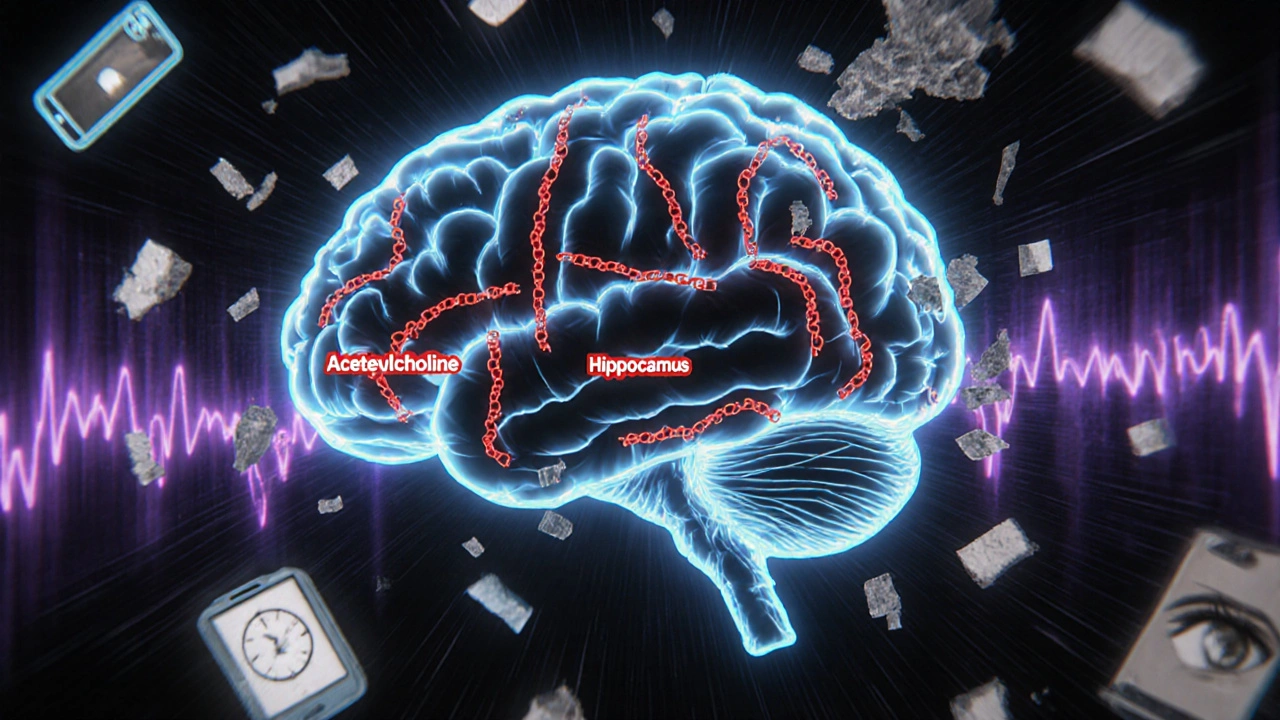Medication Brain Fog Risk Checker
Check Your Medication Risk
This tool uses the Anticholinergic Cognitive Burden (ACB) scale to assess your risk of medication-induced brain fog. Select all medications you're currently taking:
Ever had one of those days where you walk into a room and forget why? Or stare at your phone, trying to remember who you were texting? If you’ve been taking any kind of regular medication - especially over the counter - you’re not alone. More than 30% of adults over 65 report sudden memory lapses or mental fog that started after beginning a new drug. And here’s the thing: it’s not dementia. It’s not aging. It’s often just your meds.
What’s Really Causing Your Brain Fog?
Brain fog from medication isn’t a vague feeling. It’s a measurable drop in cognitive function. You might forget names, struggle to follow conversations, lose track of time, or feel like your thoughts are moving through thick syrup. These aren’t random glitches. They’re side effects tied to specific drugs that interfere with how your brain cells communicate. The biggest culprits? Drugs that block acetylcholine - a key neurotransmitter for memory and focus. These are called anticholinergics. Common ones include:- Diphenhydramine (Benadryl, Tylenol PM, ZzzQuil)
- Oxybutynin (Ditropan) for overactive bladder
- Tricyclic antidepressants like amitriptyline
- Some allergy and cold meds
Not All Medications Are Created Equal
Some drugs have a much lower risk. For example:- Second-gen antihistamines like loratadine (Claritin) or cetirizine (Zyrtec) have almost no anticholinergic effect.
- SSRIs like sertraline or escitalopram carry a much lower risk than tricyclics - odds of memory issues are just 1.8 times higher versus 4.2 times for amitriptyline.
- Extended-release opioids cause less cognitive disruption than immediate-release versions.
How to Tell If It’s Your Medication - Not Something Worse
The biggest clue? Timing. If your brain fog started within days or weeks of beginning a new drug - or after a dose increase - it’s likely drug-related. Alzheimer’s or other neurodegenerative diseases don’t show up overnight. They creep in slowly over years. Another sign? Reversibility. When people stop the offending drug, their memory often improves. In clinical studies, cognitive function on tests like the Mini-Mental State Examination improved by 15-20% within 4-6 weeks after removing high-risk meds. A 68-year-old woman in a Pharmacy Times case report started taking oxybutynin for bladder control and suddenly couldn’t find her way around her own home. She felt confused, disoriented. Within 10 days of stopping it, she was back to normal.
What to Do Next: A Practical Step-by-Step Plan
If you suspect your meds are causing brain fog, don’t just quit cold turkey. Work with your doctor. Here’s how to approach it:- Write down every medication - prescription, OTC, supplements. Include doses and when you take them.
- Look for red flags: diphenhydramine, oxybutynin, amitriptyline, benzodiazepines, opioids, steroids.
- Check your anticholinergic burden. Tools like the Drug Burden Index or the Anticholinergic Cognitive Burden (ACB) scale are now built into many electronic health records. Ask your pharmacist if your meds add up to a high score.
- Ask about alternatives. For sleep: try melatonin (0.5-5mg) or trazodone (25-50mg) - both have far less cognitive impact. For pain: duloxetine (Cymbalta) causes 40% less brain fog than opioids at similar pain relief levels.
- Change one drug at a time. If you’re on five meds, don’t drop them all. Your doctor will help you swap or taper one, then wait 1-2 weeks to see if your brain clears up before moving to the next.
- Timing matters. Take drowsy meds at night. A Johns Hopkins study found this simple switch reduced daytime brain fog by 35% in 78% of patients.
What’s Changing in 2025
The medical world is waking up. In March 2024, the FDA required all benzodiazepine labels to include clear warnings about memory loss. The NIH launched the iCARE study - a $12.7 million project to predict who’s most at risk based on genetics and drug history. Pharmacogenomic testing is now available in some clinics. If you have certain gene variants (like CYP2D6 or CYP2C19), your body processes certain drugs slower - meaning even normal doses can build up and cause side effects. One 2024 trial at the University of Michigan showed that using this testing to guide prescriptions cut cognitive side effects by 63% compared to standard care. New drugs are coming too. Daridorexant, a new sleep medication in Phase III trials, showed 92% less cognitive impairment than Ambien in early tests. And Medicare now reimburses pharmacists for doing cognitive risk assessments - a big step toward making this a routine part of care.


9 Comments
November 19, 2025 Scott Macfadyen
I used to take Benadryl every night for sleep. Thought it was harmless. Then one morning I couldn’t remember my own birthday. Not a joke. I had to check my phone. Stopped it cold turkey. Two days later, my brain felt like it had been unplugged from a fog machine. No more midnight snacks with NyQuil. Ever.
November 19, 2025 Chloe Sevigny
It is not merely anecdotal evidence that anticholinergic burden correlates with cognitive decline; it is a statistically significant, dose-dependent phenomenon corroborated by longitudinal neurocognitive assessments. The pharmacodynamic inhibition of muscarinic receptors in the basal forebrain directly impairs cholinergic neurotransmission, which is foundational to encoding and retrieval processes in the hippocampal-cortical loop. To dismiss this as 'just aging' is not only scientifically untenable but emblematic of a broader medical culture that pathologizes pharmacological iatrogenesis.
November 20, 2025 Denise Cauchon
Canada’s healthcare system is so backwards they still let pharmacies sell diphenhydramine like candy. In Germany, you need a prescription for that stuff. I had my mom on ZzzQuil for years - she forgot her own grandkids’ names. We switched her to melatonin and now she remembers who I am. 🇨🇦 is falling behind. Shame.
November 20, 2025 Andrea Johnston
Everyone’s quick to blame meds, but have you considered that maybe you’re just getting old? I’ve been on sertraline for 12 years and my memory’s sharper than my ex’s tongue. If you’re forgetting where you put your keys, maybe stop leaving them in the fridge. Also, who uses Zyrtec anymore? That’s for people who still think ‘allergy season’ means sneezing in spring, not living in a dust bowl.
November 22, 2025 Victoria Malloy
This is so important. I was terrified I had early dementia until I realized my nightly painkiller had diphenhydramine in it. Switched to plain Tylenol and my brain came back like a slow internet connection finally loading. You’re not broken. Your meds are. Talk to your pharmacist. They’re the real heroes.
November 23, 2025 Alex Czartoryski
Let me guess - you’re one of those people who thinks Ambien is the devil. I’ve been on 10mg for 8 years. Never had a blackout. My brain’s fine. You’re just scared of modern medicine because you watch too many YouTube videos about ‘toxins’. Also, your ‘study’? NIH. That’s like trusting Wikipedia. I’ve got a PhD in pharmacology, and I’m telling you - stop being dramatic.
November 24, 2025 Gizela Cardoso
I showed this to my mom. She’s 72 and on oxybutynin. She cried. Said she thought she was losing her mind. We called her pharmacist yesterday - turns out her ‘bladder med’ was also in her nighttime cold pill. She’s switching tomorrow. I just wanted to say… thank you for writing this. People need to hear it.
November 26, 2025 Ronald Stenger
Of course Americans are getting brain fog - you’re all on pills like they’re candy. In America, if you sneeze, you take three meds. In real countries, you drink tea and breathe. This isn’t science - it’s fearmongering wrapped in a JAMA paper. Stop blaming your meds and start taking responsibility for your own brain.
November 26, 2025 Samkelo Bodwana
Let me tell you something - I’ve been working as a clinical pharmacist in Cape Town for over 20 years, and I’ve seen this exact pattern repeat across cultures, income levels, and continents. It’s not just North America. In rural South Africa, elderly patients on long-term antihypertensives and antimalarials show identical cognitive declines - and they have zero access to pharmacogenomic testing or even basic medication reviews. The real tragedy isn’t that we’re overprescribing - it’s that we’re under-investing in systemic education. The science here is solid, but the equity gap? That’s the real crisis. We need policy, not just blog posts. And yes, I’ve seen people reverse this - even without fancy labs - just by stopping one drug at a time and giving their brains space to heal. It’s not magic. It’s medicine.
Write a comment